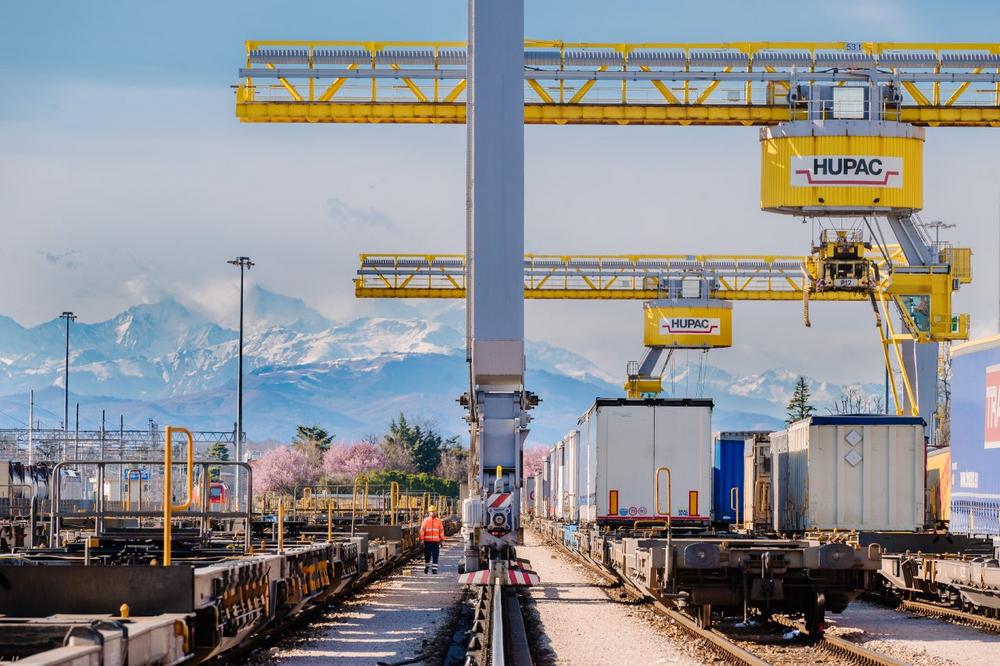Transport development above expectations
Combined transport is growing dynamically and shifting freight transport from road to environmentally friendly rail – in line with the European climate strategy. In the first half of 2021, the traffic volume in the Hupac Group network increased by 14.5% compared to the same period of last year to 568,622 road consignments. "We have closed the coronavirus gap and exceed 2019 volumes by almost 10%", emphasises Michail Stahlhut, CEO of the Hupac Group. The positive trend is confirmed within all market segments and was consistently above expectations. An exception is maritime transport, which is suffering the consequences of the Suez Canal blockage and is affected by the congestion of numerous terminals due to imbalances in hinterland traffic.
The strong logistics demand of the past months has led to capacity problems, especially in the terminals and on the rail routes. This has an impact on the reliability and quality of rail traffic. Hupac is planning a series of measures relating to the organisation and availability of assets in order to strengthen the system and ensure the required quality.
Bottleneck construction sites: round table required for international coordination
The current intensive construction activity on the Rhine-Alpine corridor, with full or partial closures lasting days and weeks, shows once again how important it is for all partners involved to act in a coordinated manner. Simultaneous construction on several sections of the line with insufficient diversion options reduces the capacity considerably. The consequences are train cancellations, delays, terminal congestions, the explosion of production costs and shifts back to the roads. Serious effects are occurring at our Italian terminals, among others, where work has been in crisis mode for weeks.
"Construction sites must not become a modal shift stopper", warns Chairman of the Board Hans-Jörg Bertschi. Hupac is calling for a round table on stable international bypass routes, because construction works on the Rhine-Alpine corridor will continue to be a constant in the coming years. All infrastructure operators of the corridor should sit at the table, including France as an important partner for the upgrading and electrification of the Wörth-Lauterbourg-Strasbourg alternative route on the left bank of the Rhine. "We are convinced that a constant, targeted exchange between the infrastructure managers and the rail freight customers is the key factor in ensuring that construction and driving on Europe’s largest supply artery can continue in the future", says Bertschi.
Investing in growth
More volume in combined transport also requires more capacity. After the pandemic-related reduction in investments, Hupac has increased its investment activity again. In the terminal sector, planning and construction is progressing at the Piacenza, Milano Smistamento and Novara sites in Italy and Brwinów in Poland. In September Hupac starts agency activities at the Brescia/Montirone terminal with its own staff, thus opening up new potential for the economic area east of Milan.
Hupac acquires a stake in WienCont
An important step in the expansion of the network on the Benelux/Germany-South-east Europe axis is the 4.16% stake in the container terminal WienCont in mid-August. "Terminals are door openers for more modal shift and support the green spirit", says Michail Stahlhut. "This participation is an important step in the expansion of our intermodal network to bring more traffic onto rail in the future and to strengthen intermodal transport". Hupac currently runs around 50 trains per week between the WienCont hub and the destinations Budapest, Duisburg, Rotterdam, Istanbul/Halkali, Ludwigshafen, Geleen, Bucharest/Ploieşti and Busto Arsizio.
Hupac is the leading network operator in intermodal transport in Europe. Its network offers connections between the main European economic areas and to destinations as distant as Russia and the Far East, with around 150 trains per day. Hupac was founded in 1967 in Chiasso/Switzerland. The Hupac Group comprises 23 companies with locations in Switzerland, Italy, Germany, the Netherlands, Belgium, Poland, Russia and China. It counts around 560 employees in full-time equivalent, 7,700 rail platforms and operates efficient terminals at key locations in Europe.
Hupac Intermodal SA
Viale R. Manzoni 6
CH6830 Chiasso
Telefon: +41 (58) 8558800
http://www.hupac.com
Director
Telefon: +41 58 8558020
Fax: +41 58 8558801
E-Mail: itonndorf@hupac.ch
![]()

